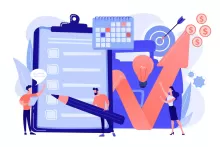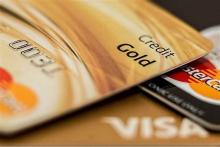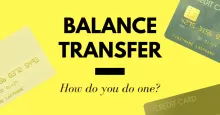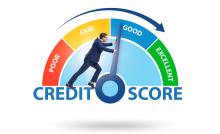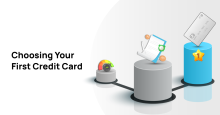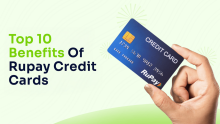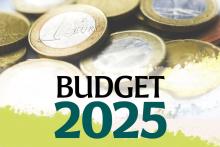Is Your Credit Card Allowing Overdraft? Know the Limit
Many people think that credit cards simply stop working once you reach the limit. But in some cases, your credit card may allow something called an overdraft. Sounds confusing? Don’t worry—this guide will explain what an overdraft on a credit card means, how it works, and what you should watch out for. Imagine this—you’re shopping or paying a bill, and your credit card is already maxed out. But somehow, the transaction still goes through. No error, no decline.
How to Increase Your Credit Card Limit Easily
If you want to spend more with your credit card or manage money better, you might want a higher credit limit. Getting a limit increase is not too hard if you follow the right steps.
This guide explains everything in a simple way so you can understand how to get a higher credit card limit without any confusion.
Co-Branded Credit Cards: What They Are & How They Work
Credit card use is growing quickly in India. As per RBI data, people spent ₹1.89 lakh crore using credit cards in December 2024, which is 11.1% more than in December 2023. Even though spending dropped a little in January 2025, it was still 10.6% higher than the same month last year. This growth is happening because getting a credit card has become easier, and more people are spending on shopping, travel, and daily needs. Young people, in particular, are using credit cards more often to earn rewards and manage their spending.
The Power of Good Credit: 10 Benefits of a High Credit Score
A credit score may seem like just a small number, but it can make a big difference in your financial life. This number can affect everything from the loans you qualify for to the rates you pay and even your job prospects. Having a good credit score can open doors to opportunities that may be harder to access with a lower score.
In this blog, we'll explore the key benefits of having a good credit score and how it can help you financially.
What Happens When You Default on a Credit Card?
A credit card default happens when you stop making the minimum payments on your credit card for a long time, usually for six months or more. While this isn’t something anyone wants, it happens more often than you might think.
In India, a lot of people struggle with credit card debt, and many find it hard to manage. The number of defaults is on the rise, with banks noticing more people falling behind on payments. If you have a credit card, here’s what you should know about defaults and how they can affect your credit:
What happens if you only pay the minimum on your credit card?
When you get your credit card bill every month, it shows the total amount you spent. But it also shows something called the "minimum payment" or "minimum due." This is the smallest amount you need to pay to avoid late fees or getting in trouble with the bank.
Usually, this is about 5% of your total bill, but it can be different depending on the bank.
Credit Card Secrets: Tips Banks Don’t Want You to Know
Credit cards are useful for handling your expenses, improving your credit score, and getting rewards like cashback or points. They can make payments easier and help you track your spending. But in India, credit card companies don’t always share all the important details clearly. Knowing these hidden facts can help you make better use of your card and avoid common mistakes.
Pros and Cons of a Balance Transfer: What You Need to Know
A balance transfer is a helpful way to deal with high-interest credit card debt. It lets you move what you owe from one or more credit cards to another card that usually has a 0% interest offer for a short time. This means you can pay off your debt without extra interest adding up during that period. It can help you save money and pay off what you owe faster. But there are also some things to watch out for, like transfer fees, higher interest rates after the offer ends, and the need for a good credit score to qualify.
Cash Advance Fee on Credit Cards: What You Need to Know
A cash advance lets you withdraw cash using your credit card, just like taking money from an ATM. It can be helpful when you need urgent cash, but it comes with high costs. In India, using a credit card for cash withdrawals includes extra fees and high-interest rates, making it an expensive option. Knowing these charges in advance can help you manage your money better and avoid unnecessary debt.
Top Credit Cards for Gig Workers and Freelancers in India
Freelancing is growing in India, especially among young professionals. Many Gen Z individuals now rely on freelance work as their main income source.
From delivery partners on Swiggy and Zomato to writers, designers, and software developers, gig workers function like independent businesses. If you earn well from freelancing, you may be able to claim tax deductions on business expenses. Keeping track of these expenses is important, and using a business credit card can make it easier.
Virtual Credit Cards: The Future of Secure Digital Payments
As digital payments become more common, financial tools are constantly evolving. One major innovation is virtual credit cards, which offer a secure and convenient way to make online payments. These cards exist only in digital form and are changing how people and businesses handle transactions. This blog explores how virtual credit cards work, their benefits, and their impact on digital payments.
Contactless Credit Cards in India: A Comprehensive Guide
Contactless credit cards are becoming increasingly popular in India. With advancements in payment technology, many banks now issue contactless cards that allow quick and secure transactions without inserting the card into a machine. But how do these cards work? Are they safe? Which banks offer them? Let’s explore everything you need to know about contactless credit cards in India.
Fuel Surcharge Waivers on Cards: How They Benefit You
Understanding How Fuel Surcharge Waivers Work on Credit Cards
In today’s world, every penny counts, especially when you're constantly on the go. Fuel is one of those necessary expenses that always seems to eat away at your budget. Fortunately, some credit cards offer fuel surcharge waivers, which can be a game-changer for frequent travelers or anyone looking to save money at the pump. But how do these fuel surcharge waivers work, and are they really worth considering? Let’s take a closer look.
How to Improve Credit Score for Better Personal Loan Rates
In the world of personal finance, one of the most important things you need to know is your credit score. Whether you’re applying for a credit card, mortgage, or personal loan, your credit score can make a huge difference in whether you're approved and what terms you get. A higher score typically means better interest rates and more favorable loan conditions. If you’re looking to boost your credit score to qualify for better personal loan rates, this blog will cover the basics of credit scores and strategies you can use to improve yours.
First Credit Card Tips: How to Apply and Get Approved
In the past, credit cards were seen as a luxury, available only to a select few due to strict eligibility criteria. However, the situation has changed drastically. Today, getting your first credit card is easier than ever and can provide you with financial flexibility. If you are planning to apply for your first credit card, this guide will provide all the details you need to know.
RuPay Credit Card Benefits: 10 Ways It Saves You Money
RuPay Credit Card: A Convenient Payment Option with Great Benefits
Imagine a payment option that combines fast payments using UPI with the flexibility of a credit card. That's exactly what RuPay Credit Cards offer. Whether you’re shopping in-store or paying at a local café with a QR code, RuPay Credit Cards let you make quick payments while deferring your expenses to the end of your billing cycle.
Maximizing Insurance Payments with the Right Credit Card
Managing regular expenses like insurance premiums is an essential part of financial planning. While paying these premiums is often seen as a liability, using the right credit card can turn this recurring expense into an opportunity to earn rewards, cashback, and other benefits. However, many credit cards do not offer incentives for insurance payments. That’s why it's important to know which cards stand out for this purpose.
Key Benefits of Add-On Credit Cards for Families and Businesses
Add-On Credit Cards: Empowering Financial Freedom for Families and Businesses
Credit cards are often seen as a tool for managing finances, earning rewards, and providing financial flexibility. However, not everyone qualifies for a standalone credit card, particularly those without a stable income or a strong credit history. This includes students, homemakers, and senior citizens. Fortunately, add-on credit cards provide an ideal solution, allowing family members to enjoy the benefits of a credit card under the primary account holder's card.
How Union Budget 2025: Impact on Your Credit Card Strategy
How Union Budget 2025’s Income Tax Slabs Will Affect Your Credit Card Strategy
The Union Budget 2025 has introduced new changes to the income tax slabs, giving taxpayers a chance to boost their savings and manage their finances more efficiently. These changes will likely lead to an increase in disposable income, which opens up fresh opportunities to rethink your credit card strategy. With more money at hand, you can focus on smarter spending, maximizing rewards, reducing debt, and making more financially savvy decisions.
UPI on Credit Cards: A Quick Guide to Activation and Usage
Payments are changing fast, and one big shift is the introduction of UPI (Unified Payments Interface) on credit cards. UPI, which was first linked to bank accounts and debit cards, can now be used with credit cards. This means you can pay directly from your credit card using your smartphone. This guide will explain how to activate and use UPI on your credit card.

